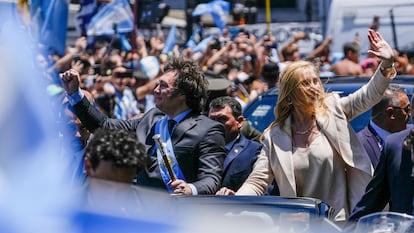Milei, at his inauguration: A $20 billion cut to the public sector and more poverty in the short term
The new president of Argentina adopted an ominous tone in his first speech to the nation and advanced his plans for a shock adjustment: ‘There is no possible alternative, there is no money’


Forty years after the return of democracy in Argentina, Javier Milei on Sunday began guiding the South American country in a new direction. With his back turned to the National Congress — “the political caste” — and facing the people who voted for him, the far-right president gave a fiery inaugural speech about the inheritance received from his predecessor and warned that he will start the term with a very deep cut to public spending of around $20 billion. “There is no possible alternative to the adjustment, there is no money,” he said. The scenario he painted was so stark that even the thousands of supporters gathered in the streets fell silent during part of the new president’s speech.
The decision to break with the tradition of speaking before the legislature was a symbolic gesture of far-right populism that is taking its first steps in Argentina with Milei. The new president was surrounded by other leaders of this rising global trend, such as Hungarian Prime Minister Viktor Orbán, former president of Brazil Jair Bolsonaro, and the leader of Spain’s Vox party, Santiago Abascal, who were all invited to the inauguration ceremony.
“Today we end a long history of decadence and decline and begin the path of rebuilding our country,” the president began as he stood on the steps of Congress in front of a packed square. The speech first went back to a supposed golden age of Argentina, in the late 19th and early 20th centuries, when the South American country was the “breadbasket of the world.” Then Milei quickly returned to the ticking time bomb he allegedly received from his predecessor Alberto Fernández, of the leftist Peronist movement that governed Argentina for decades. “No government has received a worse inheritance than what we are receiving,” he warned. Unlike the optimistic picture that Mauricio Macri painted when he became president in 2015, Milei reiterated again and again that the country he is receiving is in a desolate condition.
Official figures show that the economy is indeed in a critical situation. During the four years of Fernández’s term in office, inflation almost tripled from 54% to 142%, and poverty grew five points to exceed 40%. The primary deficit is 3%, Argentina is indebted to external and internal creditors, there are no dollars left in the central bank, and the real value of the peso, the national currency, is at rock bottom.
Fernández’s departure comes amid a high level of rejection of his management (over 70%); the former president is planning to move to Spain now that he has transferred power to Milei. On Sunday, after arriving at Congress, he went up the steps quickly and without turning to look at the crowd that was awaiting his successor and chanting slogans against his vice president, Cristina Fernández de Kirchner.
The specter of hyperinflation
The data that Milei shared with the crowd was much worse than the official figures, and included one of the ghosts most feared by Argentines: hyperinflation. The last case of hyperinflation took place in 1989, and no one who lived through it has been able to forget it. That year, prices increased an average 3,079%: it was impossible to know how much a kilogram of flour or a bottle of oil cost, because prices changed between morning and noon. Poverty skyrocketed and supermarkets were looted in popular neighborhoods. The actions of previous administrations left conditions that could make inflation reach 15,000% per year, Milei claimed.
“Our goal is to do everything possible to avoid it,” he stressed. The risk of failure would mean a growth in poverty of up to 90% and half of the population being destitute, that is, not having enough income to even buy food.
The method proposed by Milei to rebuild Argentina is a dose of sweat and tears. He anticipated spending cuts equivalent to 5% of GDP and hinted that he would eliminate subsidies for public transportation, gas, electricity and water. The numerous times he stressed the inevitability of an adjustment are reminiscent of the political slogan of the British conservative leader Margaret Thatcher in the 1980s: “There is no alternative.” Like her, the new president of Argentina believes that the solution is to open the nation’s arms to the market, and that any other solution is destined to fail.
Milei is preparing a large legislative package that he will send to Congress in the coming days. His party, La Libertad Avanza (Liberty Advances), only represents 15% of congressmembers and 10% of senators, and will have to negotiate every step it takes to approve new laws and reforms. However, Milei is confident that at least the first measures will find little opposition given the number of votes that back it, almost 56% of the population.
However, support for the new leader is not complete in a country that is more polarized than ever before. Millions of people received his words as a message of hope and were convinced, as he promised, that the imminent sacrifice “is the last bad drink to begin the reconstruction of Argentina.” They cheered him in the streets, shouting “Argentina” and “freedom.” Others, however, trembled at the thought of a new era of privatizations and pro-market economic policies that connects with the policies of the Peronist Carlos Menem in the 1990s and reminds them of the Corralito crisis of 2001 -2002, when people were not allowed to access their bank deposits.
It is unclear whether this polarization will be reflected in the streets. Argentina has a long tradition of resisting unpopular laws, but the government has warned that in this case it will not sit idly by, but respond forcefully to anyone who organizes violent protests and unauthorized street closures. “Those who want to use violence or extortion to bring about change, we tell them that they are going against us. We tell them that they are going to find a president with unwavering convictions who will use all the resources of the state to advance the changes that our country needs,” warned Milei. The person in charge of implementing these measures will be Patricia Bullrich, a presidential candidate who was knocked out of the race after winning just 24% of the vote in the first round of the election, and who previously held the Security portfolio under the presidency of Mauricio Macri.
Milei has four years ahead with great challenges. The first economist to reach the presidency of Argentina is in a hurry to get started.
Sign up for our weekly newsletter to get more English-language news coverage from EL PAÍS USA Edition
Tu suscripción se está usando en otro dispositivo
¿Quieres añadir otro usuario a tu suscripción?
Si continúas leyendo en este dispositivo, no se podrá leer en el otro.
FlechaTu suscripción se está usando en otro dispositivo y solo puedes acceder a EL PAÍS desde un dispositivo a la vez.
Si quieres compartir tu cuenta, cambia tu suscripción a la modalidad Premium, así podrás añadir otro usuario. Cada uno accederá con su propia cuenta de email, lo que os permitirá personalizar vuestra experiencia en EL PAÍS.
¿Tienes una suscripción de empresa? Accede aquí para contratar más cuentas.
En el caso de no saber quién está usando tu cuenta, te recomendamos cambiar tu contraseña aquí.
Si decides continuar compartiendo tu cuenta, este mensaje se mostrará en tu dispositivo y en el de la otra persona que está usando tu cuenta de forma indefinida, afectando a tu experiencia de lectura. Puedes consultar aquí los términos y condiciones de la suscripción digital.








































